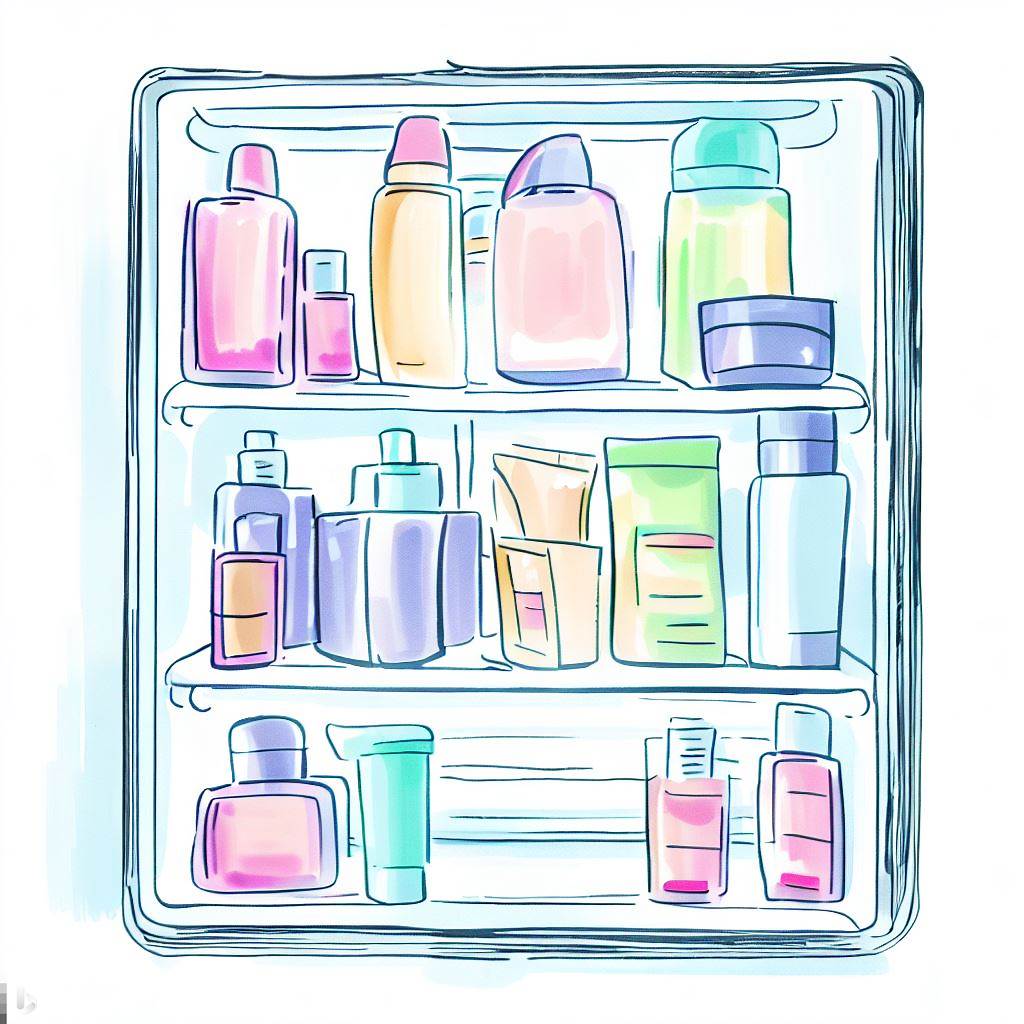Many people store their skincare products in the refrigerator to help prolong their shelf life and potency. Lower temperatures can slow down the degradation of certain ingredients like vitamins, antioxidants, and natural extracts.
However, not all skincare products benefit from refrigerated storage!
Some products may become unstable, lose effectiveness, or separate if stored at colder temperatures.
The following skincare essentials should never go in the fridge:
Vitamin C Serums
Vitamin C is an extremely popular skincare ingredient thanks to its ability to brighten skin, reduce signs of aging, and protect against environmental damage.
However, vitamin C is highly unstable and easily oxidizes when exposed to air, light, and improper storage conditions.
Most vitamin C serums are formulated at a lower pH to help maximize the vitamin’s absorption and effects.
Refrigerating vitamin C serums can alter the pH balance and encourage the vitamin C to oxidize faster.
The ideal storage place for vitamin C serums is a cool, dry place away from direct light. It’s best to keep vitamin C serums at room temperature in an opaque bottle and use them up within 3-4 months.
Retinol Creams
Retinol is a vitamin A derivative that is renowned for its anti-aging abilities. It promotes cell turnover to reduce fine lines, wrinkles, acne, and hyperpigmentation.
However, retinol also readily degrades when stored in the wrong conditions. The cool temperature of the refrigerator can cause retinol creams to become unstable and lose potency over time.
Additionally, temperature fluctuations that occur from repeatedly opening and closing the refrigerator door can shorten the shelf life of retinol products.
Leaving retinol creams at room temperature helps maintain the stability and integrity of the formulation. Make sure to store retinol away from any heat, moisture, and sunlight.
Hyaluronic Acid Serums
Hyaluronic acid is a moisture-binding ingredient that helps replenish hydration, smooth fine lines, and create a plump appearance. It works best at an optimal pH level that allows it to hold up to 1000x its weight in water.
Refrigeration can disrupt the pH balance and cause hyaluronic acid to lose its moisture-binding capabilities.
The cold temperature of the fridge may also cause hyaluronic acid serums to temporarily thicken in texture, which can impact absorption into the skin.
Hyaluronic acid serums are best left unrefrigerated at room temperature.
Facial Oils
Natural plant-based facial oils like marula, jojoba, rosehip, and argan oil have grown popular for their deeply nourishing effects. The fatty acids and antioxidants in these oils can help hydrate, repair, and protect the skin’s moisture barrier.
However, the viscosity and density of facial oils means they become quite thick and difficult to work with when chilled.
Storing facial oils in the refrigerator encourages separation between the carrier oils and active ingredients.
Leaving facial oils at room temperature allows them to retain their optimal consistency and formulated benefits.
Shea Butter
Derived from the nut of the African shea tree, shea butter is an ultra-hydrating ingredient used in many moisturizers, balms, and hair products.
In its pure form, shea butter is solid at room temperature due to its high concentration of stearic and oleic fatty acids.
When shea butter is chilled in the fridge, it hardens even further and becomes grainy and stiff in texture.
Using refrigerated shea butter on the skin or hair can feel rough and create drag.
For best results, shea butter products are better left unrefrigerated to retain their smooth, creamy consistency.
Clay Masks
Clay masks typically contain bentonite or kaolin clay that dries on the skin to draw out impurities from the pores.
The clay works effectively at room temperature, but can become rock solid in the cold environment of the refrigerator.
Refrigerating clay masks makes it nearly impossible to scoop the product out of its container.
The mask also dries too quickly on the skin before it has time to penetrate the pores.
Leaving clay masks at room temperature allows them to safely stay spreadable for each use.
Liquid Exfoliants
Liquid exfoliants contain alpha hydroxy acids (AHAs) or beta hydroxy acids (BHAs) like glycolic acid and salicylic acid to gently dissolve dead skin cells.
The optimal pH for these acids to work is between 3-4. Refrigeration can raise the pH of liquid exfoliants, rendering the acids less effective.
The fridge environment can also cause liquid exfoliants to thicken up into a unusable gel.
Letting liquid exfoliants stay at room temperature helps maintain their free-flowing liquid texture.
Gel Moisturizers
Gel moisturizers are lightweight, oil-free, and contain a high concentration of water. Popular types include hyaluronic acid gels, aloe vera gels, and water-based gels.
The high water content makes gel moisturizers prone to freezing and becoming solid masses when refrigerated.
Letting them thaw back out to room temperature can take a while and disturb the stability of the formula.
Gel moisturizers apply and absorb best when left at normal room temperature.
Sheet Masks
Sheet masks are saturated in serums and essences that deliver concentrated doses of skincare ingredients.
The liquid soak into the skin within the short 15-30 minute application.
However, the excess serum in the packaging will freeze in the refrigerator, making it hard to remove the masks. The ingredients also become less potent after freezing and thawing.
Sheet masks should always be stored at room temperature to keep the serum soft and active.
Conclusion
While refrigeration can extend the shelf life of some skincare products, it can negatively affect the stability and performance of many others.
Vitamin C serums, retinols, hyaluronic acid, facial oils, shea butter, clay masks, exfoliants, gel moisturizers, and sheet masks will all maintain their optimal integrity when left at room temperature. Be mindful of only refrigerating products that specifically indicate chilled storage on their label. Storing skincare properly helps maximize its benefits and effectiveness.
